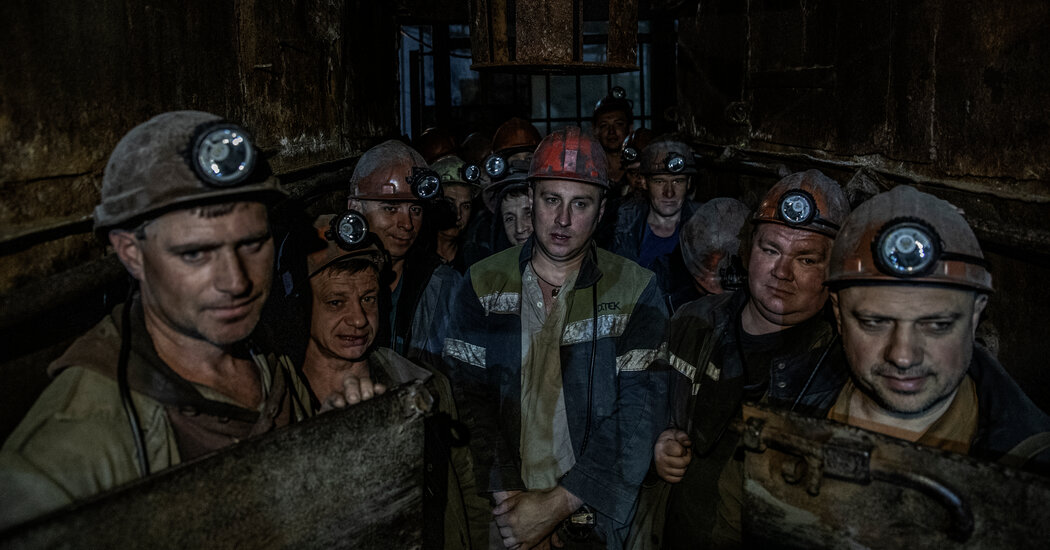
DOBROPILLIA, Ukraine — When Aleksander Maryinych enters a metal cage and descends into darkness with dozens of other miners for his six-hour shifts, the concussive thumps of an artillery war are replaced by the clatter of rail carts and the grind of machinery carving deep into the earth.
Plumes of dust and smoke from Russian bombardment are exchanged for clouds of fine coal dust, seeping into the crevices of the miners’ skin and staining their eyebrows a signature black.
“When I’m down in the mine, I forget about the war because I have to concentrate on other things,” said Mr. Maryinych, 33, a drill operator at a private coal mine run by the DTEK energy company in the Dobrapil district, along the war’s front lines in eastern Ukraine’s Donetsk region. “Everything is black and white, and there are risks.”
Accidents are common in Ukraine’s aging coal mines. Methane gas, a byproduct of coal mining, is highly explosive. In 2007, a methane blast killed more than 100 miners, the deadliest mining accident in the country’s post-Soviet history. Last year, nine miners plunged to deaths when a steel elevator cable broke at a colliery in a part of Donbas controlled by pro-Russia separatists.
Now, Russia’s heavy, indiscriminate bombing has added yet another threat to Ukraine’s coal mines, where personal fears and global anxieties meet.
The war has disrupted global energy markets, and has driven up the cost of oil and coal prices to record levels. A brutally cold Russian winter, the economic rebound from the coronavirus pandemic and Russia’s invasion of Ukraine — as well as resulting sanctions — came as the world was generating more electricity than ever from coal despite calls to combat climate change.
Global coal consumption is expected to reach a record of more than eight billion metric tons in 2022, and is likely to remain there through at least 2024, according to the International Energy Agency. The price of coal hit an all-time high of more than $400 a ton in March. This month, Germany said it would restart coal-fired power plants in order to conserve natural gas after Russia cut gas deliveries to Europe.
Despite having the world’s sixth-largest coal reserve, 90 percent of it in the Donbas region, Ukraine risks power cuts from shortages. President Volodymyr Zelensky recently announced that Ukraine was ceasing exports of oil, coal and gas to meet needs this winter.
Miners have more immediate concerns.
“If a missile hits the elevator shaft, it would be very difficult to get the miners out,” said Vitaly, 51, the manager of the DTEK mine, who asked his last name not be published for security reasons. “And if Russia destroys the power station, we cannot operate.”
Better Understand the Russia-Ukraine War
If power to the ventilation system is cut, methane could accumulate in the tunnels, he said. If water pumps are disconnected, mines can flood and collapse. Russian bombardment cut electricity at the mine, a state-run enterprise near the town of Selidove, in April, trapping miners for hours. This month, 77 miners were temporarily trapped inside a mine in a Russian-controlled part of Donbas after Ukrainian shelling disrupted power.
Despite the risks, Ukraine’s miners have little choice but to keep working.
Ukraine relies on coal for its industrial iron and steel sectors. Coal-fueled thermal power plants generate about one-third of the country’s electricity. Even with deep reserves, a decades-long decline in coal production, accelerated by corruption and neglect, and more recently, by commitments to the Paris climate agreement, demand has long outstripped supply.
Ukraine has relied on imports, mostly from Russia, but that supply has been cut by the war, worsening an economy already depressed by Russia-backed separatists who have been fighting in the Donbas region since 2014.
Ukraine’s economy liberalized after the collapse of the Soviet Union, and many unprofitable state-run mines closed. More profitable ones were privatized. Coal production plummeted to 31 million tons in 2019 from 164 million tons in 1990. Nearly 90 percent of production comes from private mines, the vast majority of it from DTEK, the dominant energy company in Ukraine, owned by Rinat Akhmetov, an oligarch who is Ukraine’s richest man.
The Donbas region used to have 82 operational mines in Russia-occupied areas, according to Sergiy Pavlov, the chairman of a local miners union, who said that only five still worked. Since Russia’s invasion began on Feb. 24, he said, at least six mines have fallen under Russian control and stopped operating.
In the heavily shelled mining town of Vuhledar, two miles from Russian positions, the few remaining residents have been without water, gas or electricity for months. The nearby mines could not operate even if employees were there to work them.
Even the DTEK mine near the city of Dobropillia, which Vitaly said produced more than all of the state-run mines combined, shut down in April after a mass evacuation as Russia’s attacks intensified. Operations have since resumed, but at a slower pace.
“We never know what can happen at any moment,” said Vitaly, the mine manager, explaining that some workers had not returned after leaving in April and that many services — shops, hospitals, rail and fuel supplies — have been disrupted, increasing the challenges of running the mine. “We worry — we’re close to the front line — but we manage as best we can. We now plan from day to day rather than from month to month.”
The DTEK mine has well-maintained equipment, individual emergency oxygen masks and fire-resistant clothing. Sacks of water hang from tunnel ceilings, and white fire retardant dusts the passageways like a fine layer of snow.
More than 2,000 feet underground, tunnel temperatures can exceed 100 degrees. During a recent shift, a bare-chested worker had peeled off his jacket (in contravention of safety measures) while a giant saw carved chunks of coal onto a conveyor belt. A dozen miners crouched in air so thick with coal dust that their headlamps glowed like Jedi lightsabers.
“This is hard work. Nobody will say it, but everyone waits for the end of their shift to come out and call their family to see if they’re OK,” Vitaly said. “We smile and laugh, but this is a difficult time for us.”
After a recent night shift, Mr. Maryinych emerged into the morning sun, showered and headed home to his wife, Olena, 34, and his two daughters, all of whom had returned the previous week after a month spent farther west for safety.
The land near their home features the towering slag heaps dotted across the region’s fertile plains. “Donbas mountains,” they are called.
“Everybody here is either a miner or a farmer,” Mr. Maryinych said.
He is both. His family has two plots where they grow fruit and vegetables and raise fowl. With his daughter Veronika, 7, he picked cherries, dropping them into a white plastic bucket before they sat down to enjoy their reward.
“For people here, coal is warmth and light,” said Mr. Maryinych, who has worked at the same mine near Dobropillia since he was 18. “Coal is also a salary, reliable and regular, twice a month.”
“If it doesn’t have coal, the city will die,” he added, “and so will we.”
Kamila Hrabchuk contributed reporting.




